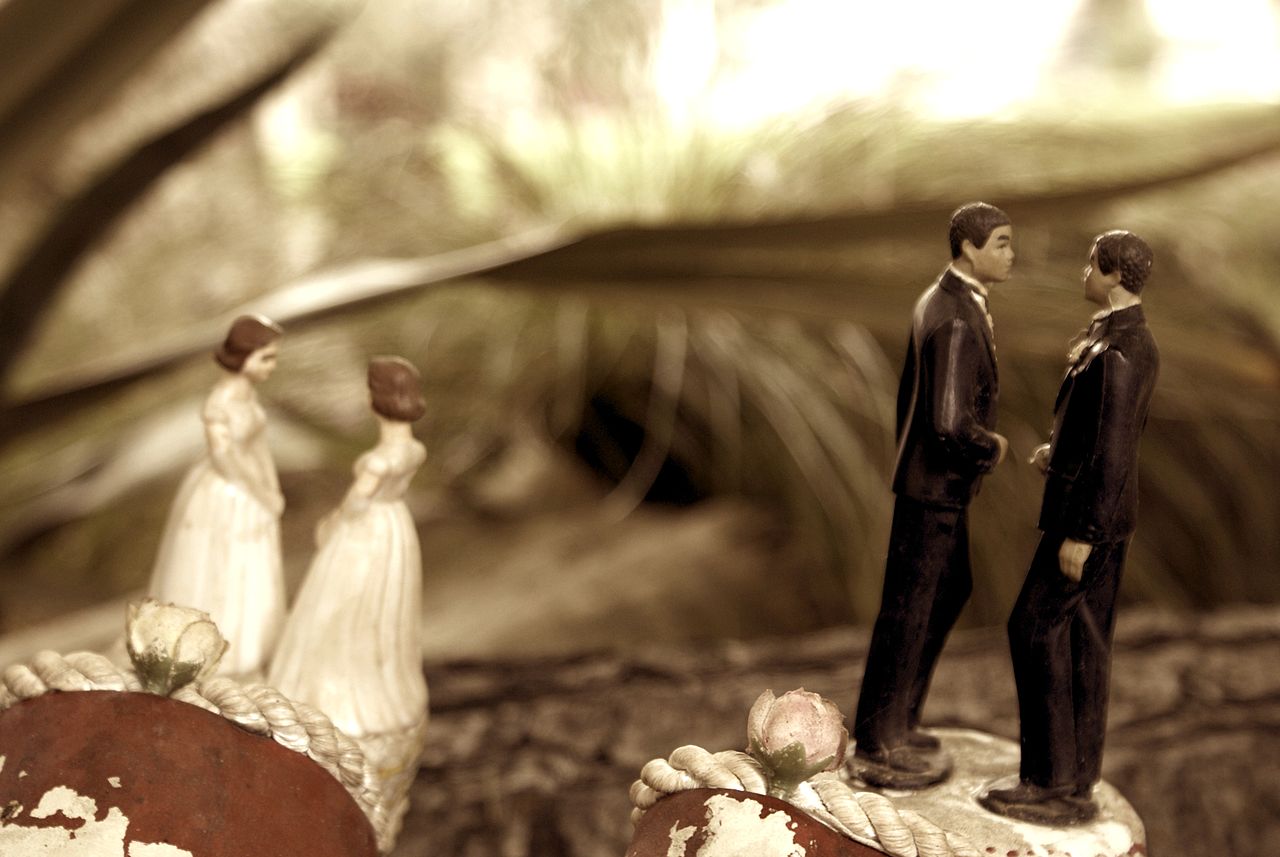Top Stories
Cakeshop Conflicts: Let Them Eat Rights
What we are witnessing is not really a conflict of rights, but a conflict of conceptions of the good.

In her essential 1993 book Rights Talk, Mary Ann Glendon worried that the language of legal rights was displacing the pleasantries of everyday social interactions. Glendon wrote that “the highly colored language of advocacy flows out to the larger society through the lips of orators, statesmen, and flamboyant courtroom performers.” Since the language of legal rights is often absolutist, Glendon predicted that its adoption for everyday use increases “the likelihood of conflict and inhibits the sort of dialogue that is increasingly necessary in a pluralist society.”
Glendon wasn’t the first to observe this phenomenon. In his journeys through the United States, Tocqueville wrote that the discourse of lawyers seems to “infiltrate through society right down to the lowest rank.”
A quick glance at this year’s Supreme Court docket – and the accompanying legal and cultural commentary – makes it hard to dispute Glendon’s and Tocqueville’s observations. Exhibit A is Masterpiece Cakeshop, Ltd. v. Colorado Civil Rights Commission. The case involves a baker who refused to bake a cake for a same-sex wedding.
A conflict between customer and provider could be about any number of things: poor customer service, religious disagreements, simple rudeness, etc. But in our society of inflated rights talk, the incident became a legal matter from the very beginning. Not only that, but it became a legal matter worthy of the highest court in the land and hotly debated in the media between the Left (who accuse the Right of weaponizing the First Amendment) and the Right (who accuse the Left of weaponizing anti-discrimination laws).

Insofar as a disagreement in a bakery is a real constitutional matter, the case is harder than partisans of either side seem willing to admit. Still, there are some truths, both legal and not, that should be obvious. And since we insist on discussing everything in the language of legalese, it’s worth trying to translate the legalese as accurately as we can.
The facts of the case are fairly straightforward and demonstrate that this is a case that could have easily avoided court – especially the highest court – with a degree of charity from the parties involved.
First, there is Jack Phillips, the owner of Masterpiece Cakeshop, who refused to create a cake for Charlie Craig and David Mullins for their wedding. Phillips believes gay marriage to be sinful and he doesn’t want to use his artistic talents as part of their ceremony. Fair enough, and the record shows that Phillips is consistent in refusing to compromise his beliefs in the course of his work. He also refuses to create cakes for Halloween and “divorce parties.” But the facts also show that Phillips refused to make the cake before even getting to a discussion of how customized the cake would be. For all he knew they just wanted whatever came out of the oven next.
Second, there is the litigious Craig and Mullins, who, to their discredit, couldn’t simply acknowledge that there are people in the world who operate with different motives and beliefs. Instead, they reported Phillips to the Colorado Civil Rights Division, which found him to be in violation of the law and ordered him to create wedding cakes for everyone or not at all. Phillips chose his conscience and had to lay off six of his ten employees.
Finally, there is the state of Colorado. In crafting its Civil Rights laws, the state apparently gave no thought to religious exemptions of small businesses. As Jonathan Rauch observed in National Affairs, the idea of absolutist civil rights legislation is a recent invention. Landmark civil rights legislation of the past often included accommodations and exemptions for small business owners and religious objectors. Yet Colorado brought the hammer down on Jack Phillips. There was no compromise. No recognition that their action might endanger other rights at stake.
Deciding which of these parties is responsible for the gravest moral failure is difficult to say. And that is perhaps another reason this case is before the highest court in the land. Another insight of Mary Ann Glendon’s was that when moral consensus breaks down, people turn to the only language they have left in common: law. Legalese – rights talk – becomes the lingua franca of our most trying moral problems in the absence of common social mores.
But what does the legalese, at least in this case, really mean?
Craig and Mullins allege that Phillips is claiming a First Amendment right to disobey neutral laws of general applicability. Specifically, Phillips wants to disobey the laws that give Craig and Mullins the right to full and equal enjoyment of places of public accommodation. Phillips believes that these public accommodation laws infringe on his First Amendment rights to free speech and free religion. Every cultural commentator under the sun casts the parties as weaponizing their claimed rights.
In 1913 and 1917, Wesley N. Hohfeld wrote his classic essays on the question of rights in the Yale Law Journal. Hohfeld devised a way to describe what form rights may take and what rights do for those who hold them. According to Hohfeld, rights can take four different forms.
- The Right As Privilege: You have a privilege to do anything so long as you have no duty requiring you not to.
- The Right As A Claim: You have a claim over the behavior of others if they have a duty to you.
- The Right As A Power: You have a power if you can alter the rights and obligations of yourself or others.
- The Right As An Immunity: You have an immunity if others lack the power to alter your rights and obligations.
It helps to place these in a real world scenario to understand just how practical they are. If you purchase a general admission ticket to a movie theater, the ticket gives you the privilege of sitting in any seat that has not yet been claimed by another ticket holder. Your only limiting duty is the duty to not take an already claimed seat. However, if you purchased a ticket with an assigned seat, you then have a claim against all other theatergoers for the seat you purchased. Everyone else has a duty to sit in their own seat. But if you read the fine print on your ticket, you will likely find a clause saying that the ticket is rescindable at the sole discretion of the proprietor (in the case of overbooking, etc.). Thus the theater retains the power to alter your rights and obligations. The only thing that could save you from such a power is an immunity, which you likely won’t have.
This framework is useful for examining the arguments in Masterpiece Cakeshop. It would seem that both litigants in the case have arguments that directly mirror each other. They argue that their own rights are claim rights while their adversaries’ rights are mere privileges. Phillips argues Craig and Mullins have a privilege to shop for cakes that is limited by their duty to respect his claim to First Amendment rights. Likewise, Craig and Mullins argue that Phillips has a privilege to bring his faith into the public square that is limited by his duty to recognize their claim to be free of discrimination. The state of Colorado, predictably, argues it has the power to alter the rights and duties of each of the parties through absolutist civil rights legislation. This is an argument that Craig and Mullins support, and against which Phillips has a claim or immunity under the First Amendment.
So who is correct? It’s not an easy question. What is clear is that it must be dangerous to start giving citizens claim rights – not against the government – but against each other. Yet that seems to be exactly what is happening.
On the one hand, legal minds will know that commercial speech is not subject to the same protections as political and religious speech. The government regulating the process of baking cakes and operating hotels is not the same as the regulation of political or religious speech. Commercial speech is the sort of thing that we can regulate to ensure citizens of a diverse society are getting along.

On the other hand, we broadly recognize the First Amendment as providing a claim against government power. And surely it seems contrary to the principles of the First Amendment to suggest that artists and religious people cannot bring their beliefs with them when they enter the marketplace. To say the First Amendment protects less than full enjoyment of public life is to suggest that the First Amendment protects only a theologically stunted view of religious man. Under this view, civil rights legislation becomes a claim right against any appearance of religious man in his real form – such as a bakery owner who wants to work according to his own beliefs.
And that, perhaps, brings us the heart of the matter. More interesting than the question of who is technically legally correct is the question about what this case reveals about our culture and understanding of rights. What we are witnessing is not really a conflict of rights, but a conflict of conceptions of the good. Both parties are claiming the protection of neutral rights, but these rights really do act like claims and trumps and weapons. And through all the smoke and mirrors of our rights talk, we can see differing articulations of the good life. Under neutral anti-discrimination laws, Craig and Mullins claim their marriage must be recognized and celebrated by any bakery they choose. And under the neutral First Amendment, Phillips argues for the right to live according to a different conception of the good and true. The stilts supporting the nonsense of rights talk have come been broken in a bakery in the Denver suburbs.
What this seems to prove is that rights can indeed be weapons. (Though it is worth pointing out that, despite what many may say, in this instance it is hard to dispute that the First Amendment is a shield to the sword of absolutist anti-discrimination laws.) And in our increasingly polarized climate, where lack of trust between citizens is at an all-time low, this should be concerning for both those who care about the First Amendment and those who care about civil protections for gay couples. If rights are continually seen – and used – as weapons to be wielded against political and religious opponents, then it will not be surprising if more people turn to the illiberal solutions on offer from the Right or the Left.
The solution is to remind people that while rights can be weapons, they don’t have to be. Like everything that can be used as a weapon, rights should be wielded responsibly. Progressives need to learn both that religious man is more than the Rawlsian caricature of him and that they have nothing to fear from him. Conservatives need to learn that they have nothing to fear from anti-discrimination laws when properly executed (and that they won’t drop into hell for baking a cake). And everyone needs to learn that rights talk should not be our first recourse in confronting social problems and cultural disagreements.
Perhaps Masterpiece Cakeshop will be an instrument in that last lesson. In a 1966 case where an argument turned into a property dispute, trial judge Daniel Fitzpatrick sent both parties away with his holding that “They are all nice people and a little mutual forbearance and understanding of each other’s problems should resolve the issues to everyone’s satisfaction.”
It is too much to hope that the Supreme Court will reach a similar conclusion in Masterpiece Cakeshop, telling the parties to sort out their problems without reference to rights talk. And what a tragedy that is. Now everyone else – all 300 million of us – will have to remember on all future trips to the bakery what is said by the nine men and women in robes.






